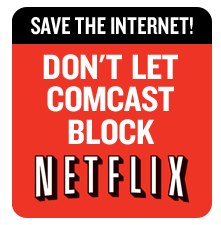Comcast-Level 3 fight goes public: Is this really about Net Neutrality?

On the surface, this Comcast-Level 3 dispute - which is quickly being moved into the court of public opinion - appears to be a slap-in-the-face challenge to Net Neutrality, the movement to ensure a free and open Internet.
After all, to hear Level 3 tell the story, big bad Comcast is suddenly shaking down the content delivery network for a recurring fee at the "toll booth at the borders of its broadband Internet access network." It makes a big accusation that Comcast is unfairly charging companies that deliver content that competes with its own. And it paints itself as a noble victim: a company that "agreed to the terms, under protest, in order to ensure customers did not experience any disruptions."

Granted, Level 3 raises some valid concerns. By waving the red flag of blatant Internet discrimination - whether real or perceived - the company is forcing the FCC to once and for all deal with the issue of Net Neutrality, as President Obama promised during his campaign. Already, a grassroots movement calling on the FCC to "Stop Comcast from blocking Netflix" is working its way through Twitter and Facebook, calling on fired-up consumers to sign petitions and be heard by Comcast and the FCC.
But is this really a Net Neutrality issue? Comcast, which is fighting back in the court of public opinion, says it's not. (I would have expected no less.) And to make its point, Comcast is launching what appears to be an educational campaign of sorts to explain these technical business relationships to the jury of the court - consumers.
The disagreement between Comcast and Level 3 has nothing at all to do with the type of content being moved over the broadband networks, Comcast spokeswoman Sena Fitzmaurice told me earlier today. This is strictly a traffic issue and it started when Level 3 came to Comcast to request more capacity beyond what was already being offered as part of a no-cost "peering" agreement.
A peering agreement, simply put, means that two companies transfer more or less equal amounts of data back and forth over their networks without charging each other. The agreements sometimes allow as much as a 2:1 ratio of traffic to move without any additional charges. But when Level 3 came to Comcast and asked for a 5:1 ratio on that traffic-exchange relationship, the broadband provider came back with a fee that's comparable to what Level 3's competitors are being charged by Comcast.
And that brings us to where we are today, with the companies launching dueling press releases and blog posts, grassroots movements and consumer rights groups like Free Press calling on the FCC to "keep Comcast in check" and the FCC quickly responding to those cries by saying that they're "looking into it," as reported by the Wall Street Journal
But Comcast is fighting back. This morning, the company posted a 7-minute video to explain how these peering relationships work, using illustrations and language that easily understood by non-technical people. This afternoon, it put a Top 10 list on its blog, pointing out, among other things, that:
- Any rumors about blocking Netflix are false.
- Peering agreements are negotiated commercial arrangements between providers like Comcast and Level 3 that carry traffic across the networks that comprise the Internet. These agreements have existed for over a decade.
- Our agreement with Level 3 is no different than our agreements with its competitors.
- 10. The bottom line is that this is a good, old-fashioned commercial peering dispute. It is not about online video, it is not a net neutrality issue, it is not about "paid prioritization," and it does not involve putting "toll booths" on the Internet.
It's a smart move on Comcast's part. If the battle is already being fought in the press - and it is - then the company really has nothing to lose. After all, it's in the best interests of Comcast to put as much spin on this if they want to preserve what's left of its consumer reputation. (Certainly, many already see Comcast as one of corporate America's evil empires.)
Likewise, they need to make the FCC understand that what they're doing isn't a challenge to Net Neutrality. Remember. Comcast has already been successful at keeping the government from dictating how they can use their network, thanks to a court ruling in April.
The FCC is already checking into Comcast on the matter of Comcast's acquisition of NBC Universal. Now, this controversy over delivery of online video - already a topic of interest for regulators - could douse optimism around final regulatory approval of that acquisition by the end of the year.
A Stifel Nicolaus investor's note today said that the allegations "come at a bad time for Comcast, and unless they're definitively and quickly knocked down or explained away," it could complicate the approval of the NBC Universal acquisition.
Another research note, by a Barclays Capital analyst, questioned the timing and Comcast's reaction. The note read:
The awkward timing makes us wonder why, assuming (Comcast) is contractually due the payments, it would choose to pursue them now, given the FCC's sensitivity around online video, rather than just letting the issue sit until after the NBCU deal is approved. As such, we believe that Level 3 may be the one pushing the peering payment issue now, given that its leverage would be much lower once the NBCU deal is approved.
None of this is to suggest that one side is right and the other is wrong on this issue or that neither side has long-term business motives. Simply put, the matter isn't as black-and-white as it might appear on the surface.
Hopefully, the FCC will keep that in-mind as it continues to look into both the Level 3 accusations and the implications of the NBC Universal acquisition.